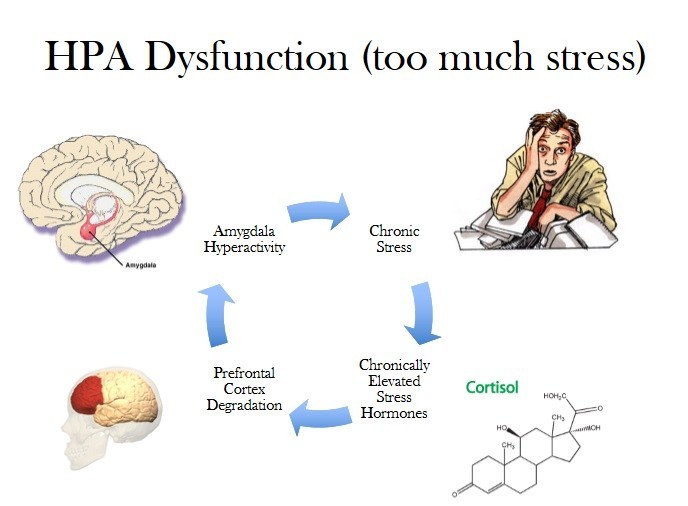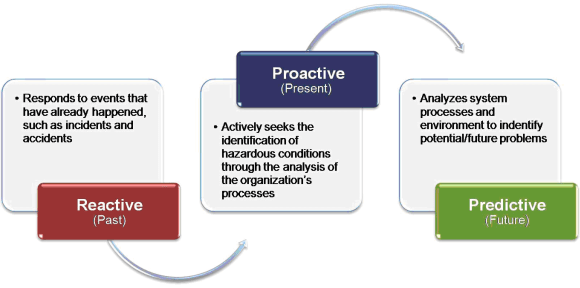Have you ever slammed on your brakes, just barely avoiding a crash? The adrenaline that courses through our bodies during a stressful situation prepares us to react accordingly. This “fight or flight” phenomenon is something all animals experience; it’s what enables us to survive danger. As humans, we have the ability to also think rationally and logically—most of the time. Studies of the brain show that, in stressful situations, the prefrontal cortex (the area of the brain responsible for things like rational thinking and decision making) is impaired and, sometimes, disabled, making it nearly impossible to think clearly while under extreme stress.

So, what does this have to do with your business?
Well, danger doesn’t always come in the form of an imminent attack (i.e. a predator or a speeding car). In some instances, we get stuck in a prolonged state of “fight or flight” when the perceived danger is drawn out, such as with an illness or the loss of a job. The constant uncertainty of trying to survive during a worldwide pandemic is a perfect example of prolonged stress. And, when the pandemic gets tough, there are countless examples of people not thinking logically because they’re stuck in panic mode.

How can you use this information to your advantage?
While adjusting, coping with, and surviving the pandemic may be tough, it’s imperative that we take a step back and look for opportunities and solutions from a calm, clear-minded, and logical perspective. The most obvious opportunity seems to lie in the fact that “remote” is the new buzzword and it doesn’t appear to be going anywhere in the near future.
- I have a friend who had been slowly growing his online adult diaper business, but has seen it take off since the pandemic started.
- A client of mine is prospering from helping businesses set up remote operations.
- Companies are adjusting to video chat meetings instead of in-person meetings while considering how this will affect things moving forward.
- Many people who were once told by management that they couldn’t work from home are now forced to do so and proving that it can be done efficiently. Will this lead to policy changes once the stay-at-home order is lifted?
- Online education has been a slow go for many organizations, but the pandemic has proven the potential of home schooling and training. Even medical support can be effectively provided remotely.
What’s most noteworthy is that people are solving the challenges of this new “remote world” rather than discarding the whole concept. It’s clear, therefore, that the best process for dealing with the pandemic is to recognize the fundamentals of change and keep them in mind as you respond:
- The first rule of change is to recognize that it is needed and that solutions may be dramatic. For example, many first thought that the pandemic would last a month or so and then things would go back to normal, but the fact of the matter is that it will last several months and many things will change forever.
- The initial reaction to change is generally denial. There is an immutable fact about denial: It does not work long-term as a problem-solving mechanism. Reality always wins. And when it does, the next step in the process is blame, which shifts responsibility onto someone or something else. “I only did it because of you! If you hadn’t done that, I wouldn’t have done this.” So, where there’s denial, blame is always available to ease the pain when reality bites.
- One of the biggest concerns in regard to denial is forecasting. It is clear that no one knows when or how the economy will return to “normal”—whatever that will be. Up until now, history has been the most used tool to forecast, but we’ve entered a new era with greater uncertainty making history a much less valuable tool.
- Change requires new rules. Science, bankruptcies, consolidation, innovation, and technology will all be a part of our new environment. Hopefully, being kinder and more grateful will become permanent aspects of our world as well. Organizations, including government, have prioritized survival right now. However, at some point, debt, growth, and excellence will have to be taken into consideration once again.
- The big will get bigger and there will be winners and losers. Tech companies like Amazon and Microsoft seem to be prospering in this environment. However, retail stores, entertainment, and restaurants may face permanent challenges.
- The most difficult and, frequently, most productive aspect of change is dealing with priorities. The most effective tool I have with clients is focusing on the 80-20 rule which recognizes that 80% of your sales and customers are usually represented by 20% of your resources. Businesses simply need to expand on the winners and cut out the losers. Reducing offerings, minimizing inventories, simplifying efforts, and focusing on top customers are all productive efforts in a difficult environment.
The trend seems to be that we consistently talk about change, but fail to adapt to the fact that it is happening faster and more often than ever before. The truth is: many people are threatened by change and have not been trained to deal with it. However, in order to thrive, we must learn not only to expect it, but also to prepare ourselves to adapt more effectively. This requires recognizing when change can be predicted (like seasons and demographics) versus responding to change as it happens unexpectedly (as is the case with natural disasters and political events).

The goal, obviously, is to be prepared for both the expected and unexpected. If we expect change when the pandemic gets tough, even if we can’t predict the details surrounding it, we will feel more empowered in our response, which, in effect, gives us a sense of agency and reduces stress. The more in control we feel, the less “danger” we perceive, which allows us, biologically, to think more clearly, rationally, and logically. It enables us to look ahead and see the bigger picture rather than focusing on “right now.” If you don’t feel safe in the present moment, it’s nearly impossible to plan for the future. The more prepared we are, the better equipped we become to enact a plan to adapt and thrive rather than simply reacting frantically in order to survive.
Related: The Most Important Aspect of Adapting to the Pandemic

